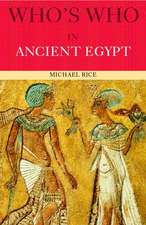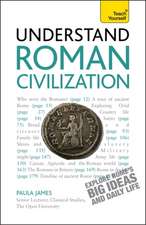Rome in Africa
Autor Susan Ravenen Limba Engleză Paperback – 11 mar 1993
The Romans governed this part of Africa for six hundred cities, twelve thousand miles of roads and hundreds of aquaducts, some fifty miles long. The remains of many of these structures can be seen today.
At the height of its prosperity, during the second and third centuries AD, the area was the granary of Rome, and produced more olive oil than Italy itself.
The broadening horizons of the Roman Empire provided scope for the particular talents of a number of Africa's sons: the writers Terence and Apuleius; the first African Roman Emperor Septimius Severus, famous Christian theologians like Tertulllian and Saint Augustine - these are just some who rose to meet the challenges of their age.
Preț: 414.53 lei
Nou
Puncte Express: 622
Preț estimativ în valută:
79.32€ • 83.03$ • 66.02£
79.32€ • 83.03$ • 66.02£
Carte tipărită la comandă
Livrare economică 31 martie-14 aprilie
Preluare comenzi: 021 569.72.76
Specificații
ISBN-13: 9780415081504
ISBN-10: 0415081505
Pagini: 292
Ilustrații: 1
Dimensiuni: 156 x 234 x 15 mm
Greutate: 0.41 kg
Ediția:Revised
Editura: Taylor & Francis
Colecția Routledge
Locul publicării:Oxford, United Kingdom
ISBN-10: 0415081505
Pagini: 292
Ilustrații: 1
Dimensiuni: 156 x 234 x 15 mm
Greutate: 0.41 kg
Ediția:Revised
Editura: Taylor & Francis
Colecția Routledge
Locul publicării:Oxford, United Kingdom
Recenzii
'This is the only account of Roman Africa in English that is both readable and reliable, and in the twenty years since its first publication it has established itself as the standard account. This new third edition has been thoroughly revised to take into account recent research, including the international excavations at Carthage. It is indispensable for students and general readers who wish to study the history of one of Rome's wealthiest provinces, and for visitors to the area who want to understand the background to North Africa's spectacular Roman remains.' - Colin Wells, Trinity University, Texas
'This is the only account of Roman Africa in English that is both readable and reliable, and in the twenty years since its first publication it has established itself as the standard account. This new third edition has been thoroughly revised to take into account recent research, including the international excavations at Carthage. It is indispensable for students and general readers who wish to study the history of one of Rome's wealthiest provinces, and for visitors to the area who want to understand the background to North Africa's spectacular Roman remains.' - Colin Wells, Trinity University, Texas
'Susan Raven's Rome in Africa ... will take you deeper into the past' - The Times
'This is the only account of Roman Africa in English that is both readable and reliable, and in the twenty years since its first publication it has established itself as the standard account. This new third edition has been thoroughly revised to take into account recent research, including the international excavations at Carthage. It is indispensable for students and general readers who wish to study the history of one of Rome's wealthiest provinces, and for visitors to the area who want to understand the background to North Africa's spectacular Roman remains.' - Colin Wells, Trinity University, Texas
'Susan Raven's Rome in Africa ... will take you deeper into the past' - The Times
Cuprins
Chapter 1 Between the Desert and the Sea; Chapter 2 The Rise of Carthage; Chapter 3 The Wars Between Rome and Carthage; Chapter 4 New Masters for Africa; Chapter 5 The Conquest of a Country; Chapter 6 Granary of the Empire; Chapter 7 The Six Hundred Cities; Chapter 8 Careers Open to Talent; Chapter 9 The First African Emperor; Chapter 10 The New Religion; Chapter 11 A Church Divided; Chapter 12 The Greatest African; Chapter 13 The Vandal Interregnum; Chapter 14 Africa Returns to the East;
Notă biografică
Susan Raven is a journalist. She is the co-author, with Alison Weir, of Women in History.
Descriere
Susan Raven recounts the story of this magnificent Empire in North Africa, drawing on a wide variety of historical and archaeological evidence in addition to her own experience of the region.













